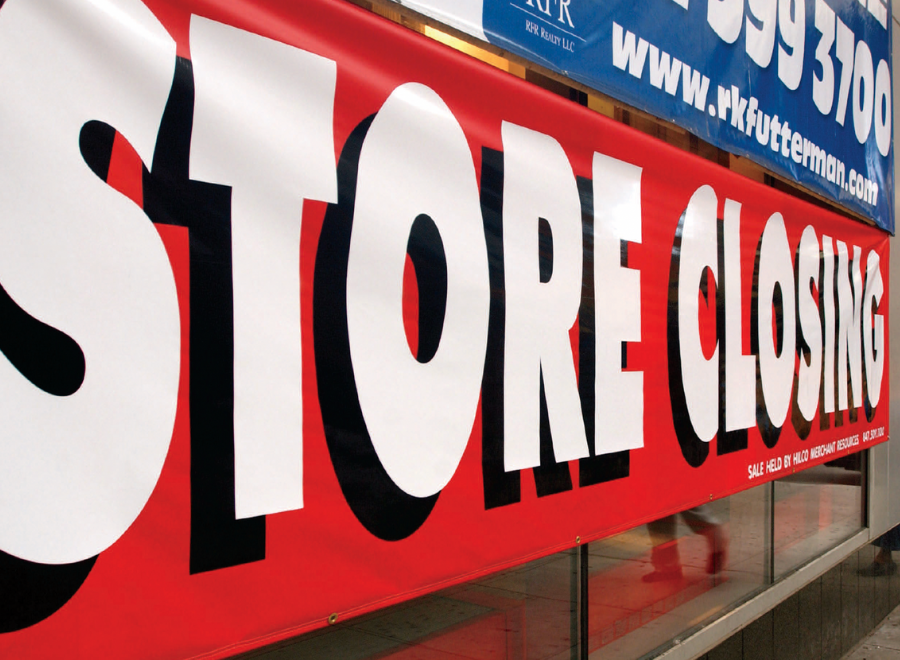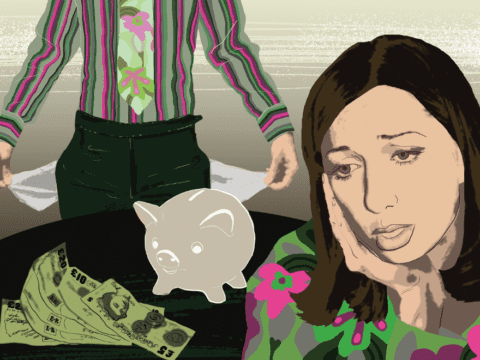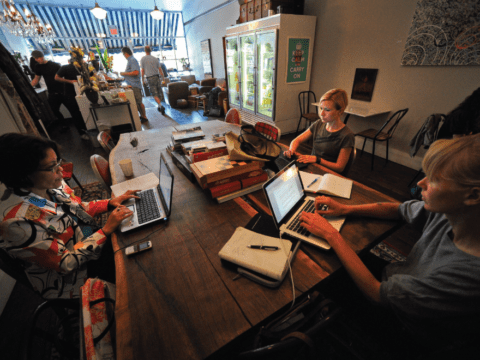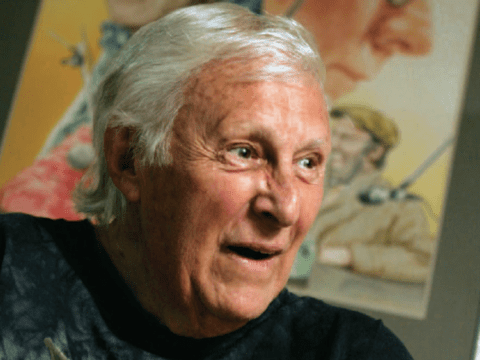Last winter, driving from Toronto to Hamilton, I turned on the radio just in time to hear Bank of Canada Governor Mark Carney reassure everyone that things will be all right. It will be tough for the rest of 2009 as Canadians weather the most brutal recession since the Great Depression — thousands of jobs lost, savings and retirement funds decimated. But the country’s chief banker predicted a return to substantial growth in 2010. My first thought was, how does he know? I don’t recall him or anybody predicting the chaotic ride we’ve been on now for months. Then a second thought: I wondered whether it is actually such a good idea to return to things exactly as they were.
Prior to the government’s “stimulus” budget in January, a coalition of Canadian church leaders, including United Church moderator Rt. Rev. David Giuliano, issued an open letter pleading for a new way of doing things. “Now is the time to change our course, dramatically,” they stated, emphasizing investments in renewable energy and green initiatives, aid for developing countries, Third World debt cancellation and a tax on currency transactions to curb speculation. All this they placed inside the framework of moral responsibility. “We believe moral values,” they wrote, “are an essential foundation for public policy that responds to the economic crisis while preventing its recurrence in a few years.”
The church leaders were raising the possibility that sometimes a crisis offers opportunity. Maybe this isn’t just an adjustment, a hangover after our grand party with globalization. Maybe we are in the midst of a sea change, a major shift akin to the Industrial Revolution pushing aside feudalism. If this is so, are we being challenged not simply to “fix” a broken economy, but to fashion some new vision, and through it, to transform our nation, our communities, our families, even ourselves?
The highway between Toronto and Hamilton — six and sometimes eight lanes wide — runs bumper to bumper past big box malls, suburban housing tracts and industry. At Oakville, the Ford Motor Company’s plants sprawl toward Lake Ontario. Once, these factories, like others in Windsor, St. Catharines and Brampton, Ont., symbolized our manufacturing prowess. Now, with massive layoffs, they represent the crisis, as do the big box malls stuffed with goods they can’t sell. Because this world has been turned upside down, people are suffering. But, as Giuliano asks in a follow-up open letter, might suffering as a result of the economic crisis “spur us to question the foundational values of our economic system?”
One thing we could do is face up to our need for perpetual growth. Last November, Peter Victor, an economist at Toronto’s York University, published Managing Without Growth: Slower by Design, Not Disaster (Edward Elgar Publishers). Victor describes himself as an ecological economist. By this he means that the economy is not some bubble separated from everything else but is a subsystem of our planet. “If you looked in from outer space, you would not see something you could call ‘an economy,’” he says. “It is a human activity. But humans are now so numerous and such a factor that we have become a planetary force, so we can’t neglect our environmental impacts.”
Victor puts forward the radical proposition that Canada can have full employment, no poverty and no government deficit — and do it all without actually growing its economy. Our strategies, though, must embrace two critical long-term principles: they must be renewable and they must be equitable. He is heartened by support for the U.S. administration’s demands that corporate executives lower their pay packages. On the renewable side, he believes a real reckoning will come when our economy finally accepts that the oil that has fuelled so much growth is finite. “In the long term,” he argues, “we dare not revert to simply more of the same. We need to produce alternatives to fossil fuel and be steered toward less material consumption.” Everybody will have to play a role, he says, including people of faith. “Isn’t one of the main messages of religion about living differently?”
The crisis is revealing all kinds of paradoxes. One of these is that bad times for the economy are often good times for the environment. The United Kingdom-based Tyndall Centre for Climate Change Research points out that emission cuts of greater than one percent “have been associated only with economic recession or upheaval.” In other words, should the economy hum along as we say we would like it to, there’s virtually no hope that we’ll achieve the carbon cuts experts say are needed to save the planet.
As the economy sputtered last fall, North American airline flights decreased by 3,000 per day. Traffic in and out of the United Kingdom fell by three percent. This, admittedly, is only a fraction of the almost 70,000 flights that take off and land worldwide every day, but still an extraordinary reduction in the environmental footprint of commercial aviation. Similarly, the number of cars manufactured globally — a figure that had increased by three percent annually in the decade leading up to 2008 — fell by 10 percent last year.
Workers face real hardships, but you have to ask: how long can the Earth sustain perpetual annual increases?
For those on the front lines, being philosophical can seem a bit of a luxury. Their preoccupations are to ease pain and hope for the best. Larry Laycock, a member of Westminster United in Whitby, Ont., is in charge of quality control at a plant that manufactures office furniture. Last November, “it was like someone turned off the tap,” he says.
U.S. sales (the majority of the plant’s customers are banks) dropped by 80 percent; those in Canada by 50 percent. The company, with a workforce of 225, struggled for a couple of months then laid off 21 employees and put the rest on a three-day work week. Those laid off must survive on employment insurance while they search for new jobs. The remainder have to live on a little more than half their former wages while waiting for things to turn around. Laycock hopes they will turn around, though he admits, “I don’t know that we’re ever going to see the rate of growth we had over the past five years; it’s not sustainable in the long term.”
A second paradox is the way in which ours is a crisis of surplus. When politicians and the media told us we could aid things by shopping, my wife and I looked at each other. We already have too much stuff. Our economy produces things much more efficiently than we can use them up. Our job has been to consume all these TV sets, stereos, iPhones and, yes, office furniture whether we need them or not. Recently, Madeleine Bunting wrote in the Guardian that people were talking about “creative frugality.” A good idea, one might think, “an experimentation with the values needed to shift to low-carbon living.” The paradox, however, is that the ethical inclination to conserve is precisely what many of our leaders are urging us against.
Needing a road map, we’ve been going back to the Great Depression. What did people learn from that crisis? In 1935, Mary Wilson was nine years old and living with her parents in the industrial town of Preston, Ont. Though not rich, they weren’t wanting; a large garden and relatives who owned a farm helped. Wilson, a member of Unity United near Midland, Ont., remembers it as a time when “people were ready to take an extra step to look after one another, even strangers.” Unemployed men emerging from a nearby hobo jungle marked the gatepost of Wilson house so others would recognize it as a reliable place to stop and ask for a bite.
Human kindness was a mark of that difficult time, but so was the push, led substantially by the churches, for systemic change. Out of the Depression came Keynesian economics and an acceptance of the idea that governments should help to protect and sustain the individual. It is astonishing how novel and dangerous this notion seemed at the time. What fresh and possibly long-overdue ideas might emerge this time?
Already we hear uplifting stories about people voluntarily taking pay cuts to spare colleagues from being laid off. If we look at them properly, difficult times can provide the chance to address some of our most deeply ingrained assumptions about how we live, work and relate to one another. After all, as economist Paul Romer once pronounced, a crisis is a terrible thing to waste.
***
This story first appeared in The United Church Observer’s May 2009 issue with the title “Pain and possibility.”















